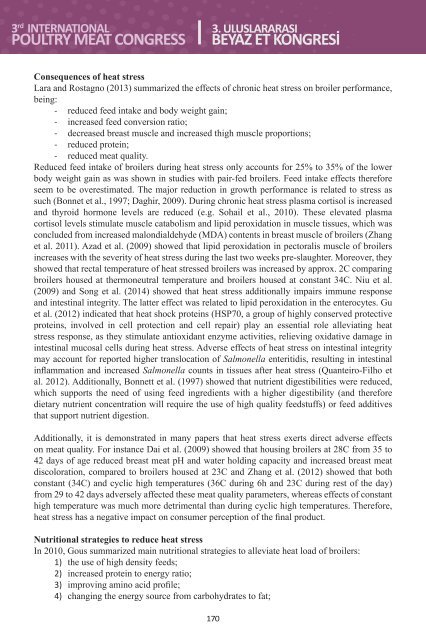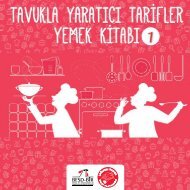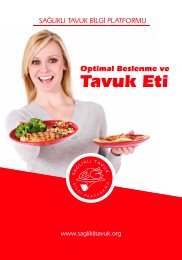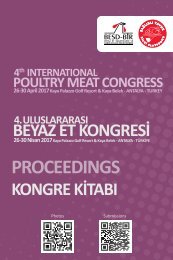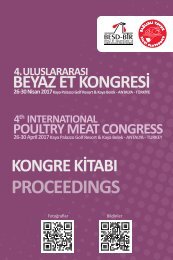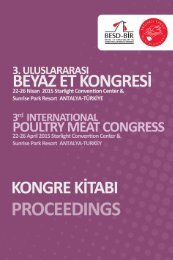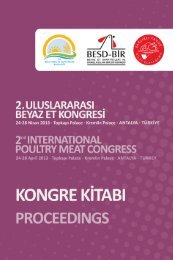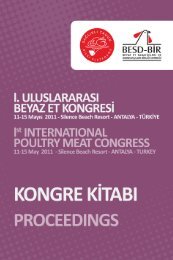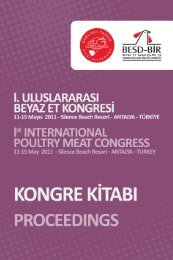3rd International Poultry Meat Congress
Proceedings
Proceedings
You also want an ePaper? Increase the reach of your titles
YUMPU automatically turns print PDFs into web optimized ePapers that Google loves.
Consequences of heat stress<br />
Lara and Rostagno (2013) summarized the effects of chronic heat stress on broiler performance,<br />
being:<br />
- reduced feed intake and body weight gain;<br />
- increased feed conversion ratio;<br />
- decreased breast muscle and increased thigh muscle proportions;<br />
- reduced protein;<br />
- reduced meat quality.<br />
Reduced feed intake of broilers during heat stress only accounts for 25% to 35% of the lower<br />
body weight gain as was shown in studies with pair-fed broilers. Feed intake effects therefore<br />
seem to be overestimated. The major reduction in growth performance is related to stress as<br />
such (Bonnet et al., 1997; Daghir, 2009). During chronic heat stress plasma cortisol is increased<br />
and thyroid hormone levels are reduced (e.g. Sohail et al., 2010). These elevated plasma<br />
cortisol levels stimulate muscle catabolism and lipid peroxidation in muscle tissues, which was<br />
concluded from increased malondialdehyde (MDA) contents in breast muscle of broilers (Zhang<br />
et al. 2011). Azad et al. (2009) showed that lipid peroxidation in pectoralis muscle of broilers<br />
increases with the severity of heat stress during the last two weeks pre-slaughter. Moreover, they<br />
showed that rectal temperature of heat stressed broilers was increased by approx. 2C comparing<br />
broilers housed at thermoneutral temperature and broilers housed at constant 34C. Niu et al.<br />
(2009) and Song et al. (2014) showed that heat stress additionally impairs immune response<br />
and intestinal integrity. The latter effect was related to lipid peroxidation in the enterocytes. Gu<br />
et al. (2012) indicated that heat shock proteins (HSP70, a group of highly conserved protective<br />
proteins, involved in cell protection and cell repair) play an essential role alleviating heat<br />
stress response, as they stimulate antioxidant enzyme activities, relieving oxidative damage in<br />
intestinal mucosal cells during heat stress. Adverse effects of heat stress on intestinal integrity<br />
may account for reported higher translocation of Salmonella enteritidis, resulting in intestinal<br />
inflammation and increased Salmonella counts in tissues after heat stress (Quanteiro-Filho et<br />
al. 2012). Additionally, Bonnett et al. (1997) showed that nutrient digestibilities were reduced,<br />
which supports the need of using feed ingredients with a higher digestibility (and therefore<br />
dietary nutrient concentration will require the use of high quality feedstuffs) or feed additives<br />
that support nutrient digestion.<br />
Additionally, it is demonstrated in many papers that heat stress exerts direct adverse effects<br />
on meat quality. For instance Dai et al. (2009) showed that housing broilers at 28C from 35 to<br />
42 days of age reduced breast meat pH and water holding capacity and increased breast meat<br />
discoloration, compared to broilers housed at 23C and Zhang et al. (2012) showed that both<br />
constant (34C) and cyclic high temperatures (36C during 6h and 23C during rest of the day)<br />
from 29 to 42 days adversely affected these meat quality parameters, whereas effects of constant<br />
high temperature was much more detrimental than during cyclic high temperatures. Therefore,<br />
heat stress has a negative impact on consumer perception of the final product.<br />
Nutritional strategies to reduce heat stress<br />
In 2010, Gous summarized main nutritional strategies to alleviate heat load of broilers:<br />
1) the use of high density feeds;<br />
2) increased protein to energy ratio;<br />
3) improving amino acid profile;<br />
4) changing the energy source from carbohydrates to fat;<br />
170


